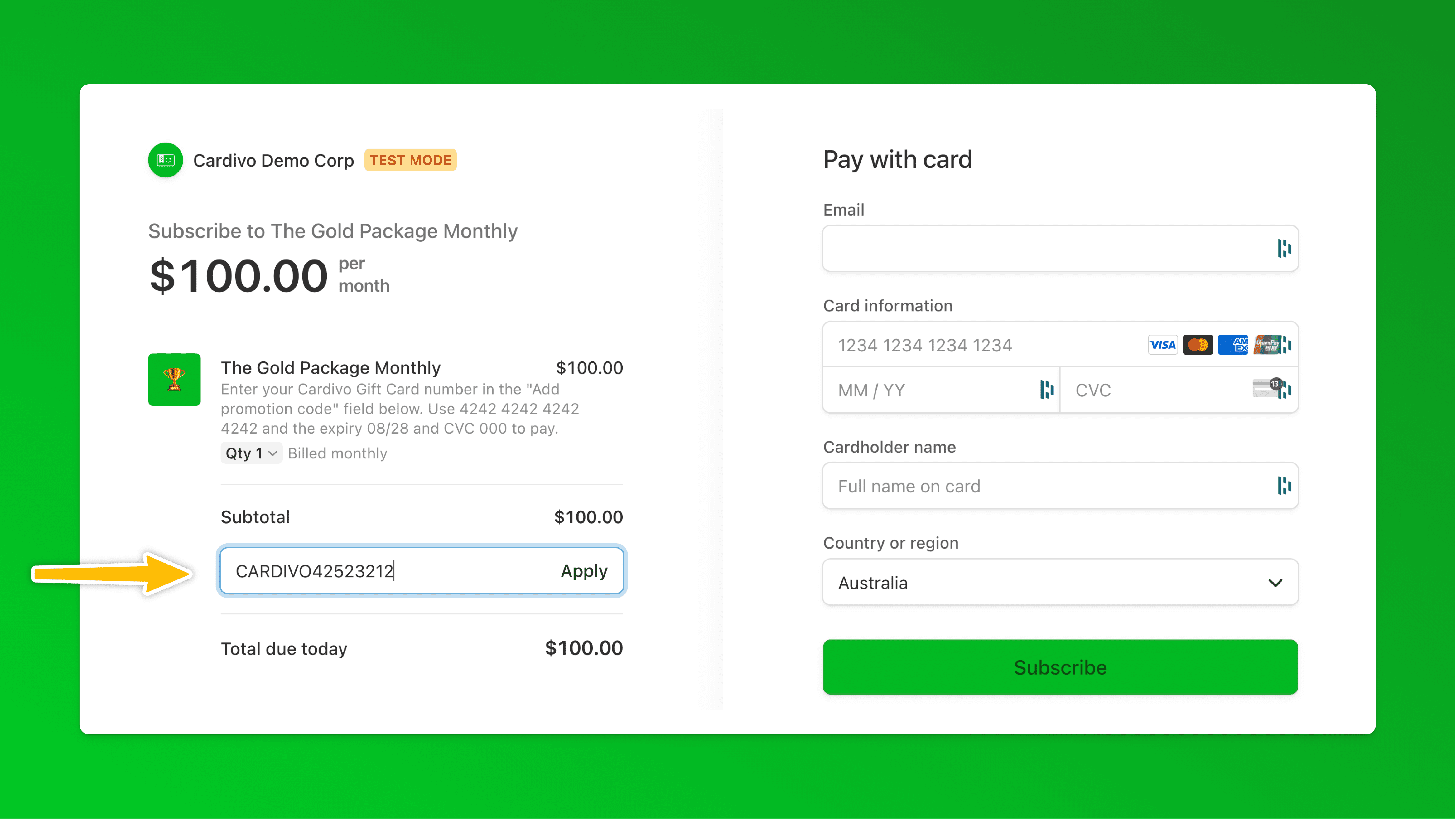Gift cards, especially digital ones, are a fantastic way to boost revenue and attract new customers, but they also come with some regulations you need to be aware of. From the United States to the European Union, gift card laws governing the issuing, expiry, and usage of physical and digital gift cards vary. This post breaks down these rules into summarized bullet points by country so you can ensure you’re always compliant with the laws applicable to you.
In most countries, the rules for digital and physical gift cards are the same – some of the points below won’t apply to you if you’re offering digital gift cards using a tool like Cardivo.
We aim to give you accurate and up-to-date information, but please treat this as a general guide only. Always check and comply with the laws specific to your country or region.
Gift card laws in the United States

In the United States, gift card regulations are primarily governed by the Credit Card Accountability Responsibility and Disclosure (CARD) Act of 2009. Key points include:
-
Expiration Dates: Gift cards cannot expire within five years from the date of issuance.
-
Fees: Dormancy, inactivity, and service fees are allowed but must not be imposed until the card has been inactive for at least one year. Additionally, only one fee can be charged per month.
-
Disclosure: All terms and conditions must be clearly disclosed to the consumer at the time of purchase. This includes any fees and expiration dates.
-
Replacement: In some states, consumers can request a replacement card if the original is lost or stolen, though this might come with a fee.
These regulations are designed to protect consumers and ensure transparency. Compliance is essential for businesses to avoid legal pitfalls and maintain customer trust.
See more detailed information on U.S. Gift Card law here from the Cornell Law School.
Gift card laws in California
California has specific laws governing gift cards that provide added consumer protections beyond federal US regulations. Key points include:
-
No Expiration: Gift cards offered by businesses to be redeemed at that business only cannot have an expiration date. This ensures that consumers can use their cards indefinitely. When using a tool like Cardivo, you can easily comply with this with a simple toggle in your gift card settings.
-
Fees: California law prohibits service fees for most gift cards, making them more consumer-friendly.
-
Cash Redemption: If a gift card’s balance is $10 or less, the consumer can request to redeem the balance for cash. This rule helps consumers avoid being stuck with small, unusable balances.
-
Replacement Policy: Stores are required to replace lost, stolen, or damaged cards, provided the consumer can prove the purchase and remaining balance.
-
Exemptions: Some gift cards are exempt from these rules, including promotional cards, cards issued as part of a loyalty program, or cards given as a refund for returned merchandise.
These regulations make California one of the most consumer-friendly states regarding gift card laws, providing significant protections and benefits for cardholders.
Planning on offering gift cards as a business based in California or selling to California residents? Read our detailed guide on California gift card laws here.
Gift card regulations in Canada

In Canada, gift card regulations are outlined at the provincial level, but several common rules apply across the country. Notably:
-
Expiration Dates: Most provinces prohibit expiration dates on gift cards, especially for cards purchased with a set monetary value. Some exceptions exist, such as for promotional or charitable gift cards.
-
Fees: Fees are generally restricted. For instance, Ontario and British Columbia prohibit most fees, except in cases of card replacement or if the card is for a specific service.
-
Disclosure: Clear information about any terms and conditions, including potential fees or expiry policies (if applicable), must be provided at the time of purchase.
-
Replacement: Policies for replacing lost or stolen cards vary but often include provisions for card replacement with proof of purchase, sometimes subject to a fee.
These guidelines aim to protect consumers from unfair practices and ensure transparency, helping businesses foster trust and customer satisfaction.
Legal requirements for gift cards in Australia

Australia has unified gift card regulations that apply nationwide, ensuring consistency and consumer protection. Key aspects include:
-
Expiration Dates: As of November 1, 2019, all gift cards sold in Australia must have a minimum expiry period of three years. This rule helps ensure that consumers have ample time to use their gift cards.
-
Fees: Post-purchase fees are largely prohibited. This means that businesses cannot charge fees for the use or activation of the gift card after it has been purchased.
-
Disclosure: Clear and legible information regarding the expiry date and any applicable terms and conditions must be prominently displayed on the gift card. This ensures that consumers are fully informed at the time of purchase.
-
Replacement: While not a federal mandate, many businesses offer replacement policies for lost or stolen cards, often requiring proof of purchase.
These regulations promote consumer confidence and fairness, making it easier for businesses to offer digital gift cards while ensuring compliance.
European Union

Within the European Union, gift card regulations can vary significantly between member states, but some common principles are observed due to consumer protection laws. Key points include:
-
Expiration Dates: EU member states generally allow gift cards to have expiration dates, but these dates must be reasonable. In some countries, the minimum validity period is set by law, often ranging from one to three years.
-
Fees: Regulations on fees differ, but transparency is a must. Any fees related to activation, maintenance, or usage must be clearly communicated to the consumer at the time of purchase.
-
Disclosure: Full disclosure of terms and conditions, including expiration dates and any fees, is mandatory. This information must be provided in a clear and understandable manner.
-
Replacement: Policies for replacing lost or stolen cards vary by country, but many EU member states require businesses to offer a replacement, possibly with a fee, if proof of purchase is provided.
-
Usage Restrictions: Any restrictions on where or how a gift card can be used must be clearly communicated at the point of sale. This includes limitations on specific products, services, or locations.
-
Partial Redemptions: Some member states require businesses to allow partial redemptions, meaning the consumer can use a portion of the card’s value and retain the remainder for future use.
-
Refund Policies: Regulations may also cover refund policies, requiring businesses to provide refunds or replacements if the cardholder can prove the card was lost or stolen.
While the European Union provides a general framework for consumer protection, some individual member states have their own specific regulations regarding gift cards and gift vouchers. Here are some with noteworthy differences:
Gift card laws in Germany
-
Expiration Dates: Germany allows expiration dates on gift cards, but they must be reasonable. Typically, the validity period is at least three years from the end of the year in which the card was issued.
-
Fees: Activation and maintenance fees are generally not permitted. Any applicable fees must be clearly disclosed at the time of purchase.
-
Partial Redemptions: German law supports partial redemptions, allowing consumers to use a portion of their gift card balance and retain the remainder for future use.
Gift card laws in France
-
Expiration Dates: Many gift cards in France typically have a validity period of 1 to 3 years. However, the expiration date must be clearly indicated on the card.
-
Replacement: French law mandates that lost or stolen gift cards must be replaced if the consumer can provide proof of purchase.
Gift card laws in Italy
-
Expiration Dates: In Italy, gift cards must have a minimum validity period of three years. This ensures that consumers have ample time to use their cards.
-
Fees: Service fees are generally prohibited. Any exceptions must be clearly communicated to the consumer.
Gift card laws in Spain
-
Expiration Dates: Spanish law stipulates that gift cards should have a minimum validity period of five years.
-
Mandatory Cash Redemption: If the gift card balance is less than €10, the cardholder can request to redeem the remaining balance for cash.
Gift card laws in Netherlands
-
Expiration Dates: Gift cards can expire, but the expiration date must be reasonable and clearly communicated. Typically, a minimum validity period of around three years is common.
-
Fees: Any fees associated with the issuance or use of gift cards must be transparent and disclosed at the time of purchase.
These specific national regulations provide an added layer of consumer protection, ensuring that individuals can use their gift cards fairly and transparently. As a business owner, it’s crucial to stay informed about these laws to build trust with your customers and ensure you’re compliant.
General recommendations to ensure your gift card program is compliant
Most countries and jurisdictions follow a common-sense based approach to gift card laws. To ensure you’re compliant, here are some general recommendations for your gift card program:
-
Be transparent: Be clear and about all terms, conditions, redemption options, and fees associated with your gift cards. Clear communication helps customers feel secure and informed and builds trust in your brand.
-
Be generous with validity: Many countries mandate a minimum validity period for gift cards, often ranging from one to five years. This ensures consumers have ample time to use their cards without feeling rushed. If you plan on selling gift cards globally to customers anywhere, the safest option is to not have any expiry date to ensure you’re covered everywhere. The next best option is to offer at least a 5 year validity period as this covers many jurisdictions.
-
Exceptions: There are often exceptions for promotional or complimentary gift cards, which may have shorter expiration periods. However, these exceptions must also be clearly disclosed.
Benefits of Digital Gift Cards
-
Word of Mouth: When existing customers purchase gift cards for friends and family, it introduces your brand to new potential customers. This form of word-of-mouth marketing is highly effective.
-
Ease of Sharing & instant: Digital gift cards can be easily and instantly shared via, making it convenient for customers to gift your services or products to their friends and family. This is also why they make excellent last-minute gifts as well.
-
Attracting Different Demographics: Gift cards can appeal to a diverse range of customers, including those who might not typically shop with you. This can expand your customer base and increase brand awareness.
-
Advance Sales: When customers purchase gift cards, it generates immediate revenue, even before the actual products or services are redeemed. This can help improve cash flow and fund business operations.
-
Upselling Opportunities: Customers using gift cards frequently spend more than the card’s value, leading to increased sales. This creates opportunities for upselling and cross-selling.
-
Seasonal Sales Boost: During holidays and special occasions, gift card sales typically surge. This can provide a significant boost to your revenue during peak seasons.
-
Customer Retention: Gift cards encourage repeat visits and purchases, fostering customer loyalty and long-term revenue growth.
By incorporating digital gift cards into your strategy, you can create a sustainable and lucrative revenue stream for your business and let your existing customers bring you new ones.
And if you use Cardivo to offer your gift cards, you ensure your customers and gift card recipients get a world-class gift card experience, with minimal additional admin or busy-work needed. Cardivo automates most things and our built-in self serve tools make it easy for people to manage their own gift cards.










 Gift card holders will still be able to access and click through to the “Check balance” link when the sales page is inactive. When you toggle it back on, your sales page will immediately start working again. This toggle has no impact on existing gift cards and their redemptions and those will continue to work. It just prevents new gift cards from being purchased.
Gift card holders will still be able to access and click through to the “Check balance” link when the sales page is inactive. When you toggle it back on, your sales page will immediately start working again. This toggle has no impact on existing gift cards and their redemptions and those will continue to work. It just prevents new gift cards from being purchased.









